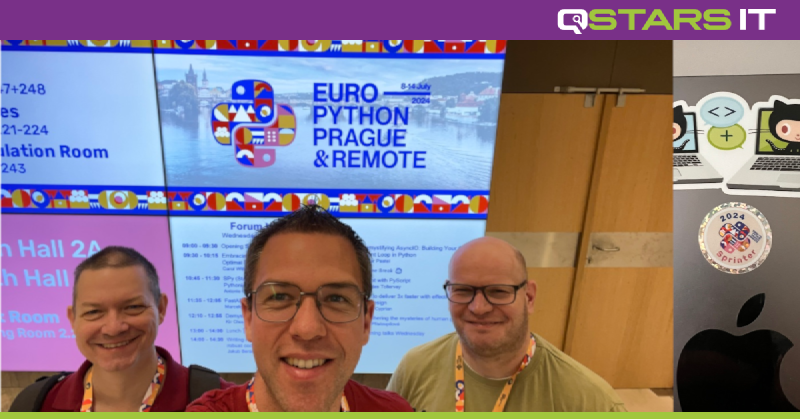July came around again, which meant it was time for another edition of EuroPython! Like last year, it was held in the beautiful city of Prague.
AI and Machine Learning
Like with all (technical) conferences in the past year, AI is dominating the landscape. While there was a lot of focus on AI and LLM during EuroPython 2023, it felt like there was more room for other topics this year. Of course, AI wasn’t completely gone, especially RAG was pretty popular this year.
Typings
While this is a bit of controversial topic within the Python landscape, adding type annotations to your codebase is becoming more popular. Especially with bigger codebases, adding type annotations can improved the readability, integrity and maintainability of a codebase. During one of the talks, given by Kir Chou, we dived into PEP 729 which is a proposal to govern the typing process. While it’s still in-progress, it has support from all the major type checkers to create a consistent typing experience.
If/when this PEP gets accepted, type checkers should become more robust and consistent, resulting in more resilient code.
Talks
In general, the talks were really good. The amount of proposals was huge (a new record, even!) so there was more than enough to choose from. A lot of talks were from a personal perspective from people who just wanted to share experience on certain topics. It was nice to see they included real-life use-cases. For example, the talk How to sell a big refactor or rewrite to the business? included about 5 use-cases when a company decided to do a rewrite/refactor including the reasoning and strategy. This is incredibly helpful if you’re dealing with this situation as well.
Social Event

The social event is one of the highlights of the conference. It’s a paid event to relax, network and hangout with friends from earlier EuroPythons. This year it was being held in an awesome location, the historic Gabriel Loci ex-monastery (which also was the location for PyCon CZ!).
This year’s social event was different than others we’ve attended. Everyone was free to bring their instruments and boardgames. You could either sit outside (which is pretty nice in terms of temperature this time of year) and have a chat with each other, or sit inside and play boardgames. There as also a jam session for those who brought their instruments.
This event is were friendships are made!
Sprints
The sprints were a bit new to us. Normally we’d spend the weekend in the city the conference is held in, however since this was my 5th time in Prague and we heard really good things about the sprint weekend, we decided to join this year.
The sprint weekend is a weekend where open-source projects invite EuroPython attendees to join in their coding efforts. All skill levels are welcome to join as most issues range from beginner to expert. This year, the sprint weekend was held in the University of Economics of Prague. There was food, drinks, good wifi and cool projects to work on. In terms of networking, this was the perfect place to do so! We met awesome people and got talked with some of the people who gave talks or are EuroPython/PyCon organizer.
This is definitely something we´d like to participate on again next year!
The projects we’ve worked on:
- Bas CPython
- Benny MicroPython
- Derk Falcon
DEI
EuroPython has been actively promoting Diversity, Equity, and Inclusion (DEI) in its community. This is one of the areas where it differs from other conferences (that we attend) and it’s highly integrated into the program and events.
Here are some key aspects of DEI at EuroPython:
Code of Conduct
EuroPython enforces a comprehensive Code of Conduct to ensure a welcoming and harassment-free environment for all participants. This includes clear guidelines on expected behavior and steps for reporting incidents.
Diversity Grants
The conference offers diversity grants to support individuals from underrepresented groups, helping them to attend the conference by covering expenses such as travel and accommodation.
Diverse Speaker Line-up
EuroPython strives to include a diverse range of speakers, ensuring representation from different backgrounds, genders, and communities. They actively encourage and support new and diverse voices in their call for proposals.
Workshops and Panels on DEI
The conference often includes workshops, panels, and discussions focused on DEI topics. These sessions are designed to raise awareness, share best practices, and promote actionable steps towards inclusivity within the Python community.
Community Building Activities
EuroPython fosters a sense of community through various networking events and activities that are inclusive and accessible to all participants, aiming to build a supportive and diverse community around Python.
Accessibility
The conference venues and materials are chosen and designed with accessibility in mind, ensuring that participants with disabilities can fully engage with the event.
Childcare Facilities
Recognizing the importance of supporting attendees with families, EuroPython often provides childcare facilities, making it easier for parents to participate in the conference.
Playlist / Videos
If you’d like to see the sessions, the initial version of the YouTube playlist is now available!
